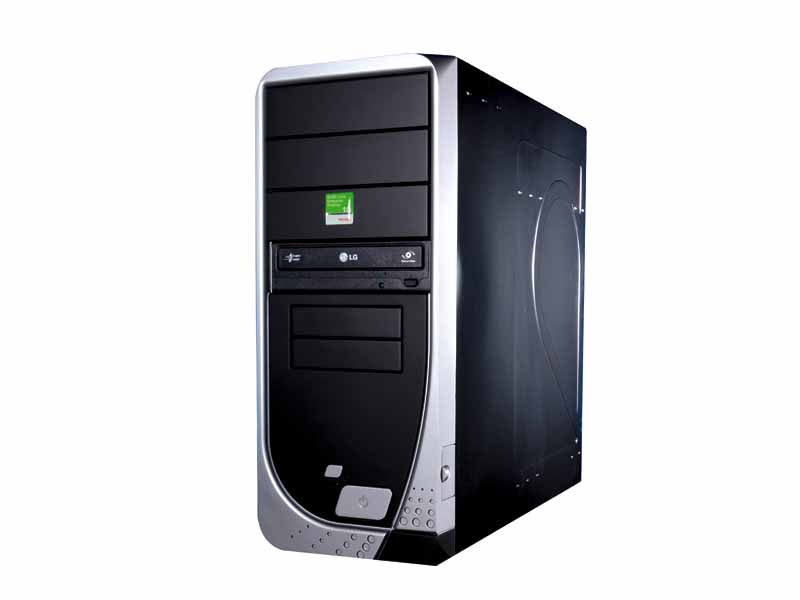TechRadar Verdict
We love the attitude of the PC5E and, we definitely love the price – only the mediocre performance lets it down
Pros
- +
Great price
- +
Energy efficient
- +
Solid build
Cons
- -
Disappointing performance
- -
Not very comfortable to use
Why you can trust TechRadar
Most people think the home PC processor game is a two-horse race.
It's AMD's clunky yet somehow competitive filly against Intel's heavily armoured rocket stallion, right?
Well, not quite. Look closely a couple of lengths behind and you'll see a plucky Shetland pony, its little legs doing ten to the dozen, somehow keeping pace with the big boys.
That's VIA, a company that has always specialised in covering those niches that the bigger boys traditionally skipped over, like x86-based platforms for embedded and low-power systems. And as we'll find out, it's been dodging the trip to the glue factory for some time.
Attractive price
There's a good reason VIA's C7 chip has been chosen for the PC5E – it's all a part of the message.
Those five 'E's – economy, ecology, evolution, ergonomics and education, fact fans – are representative of a philosophy that's meant to be part of each and every one of these machines.
Economy we can see; that £145 price tag is certainly attractive, and there's a keyboard, mouse and speakers (all hideously cheap but functional nonetheless) included for the cash.
We can see the education market being interested, since purchasing a room full of these will hit the budget only half as hard as the equivalent number of Windows machines.
Awkward ergonomics
The PC5E certainly fits some of the looser definitions of the word, but those peripherals are hardly the most wrist-friendly. The C7 processor isn't particularly quick on its heels, so the 'ease of human interaction' aspect of ergonomics doesn't count either.
It's sturdy – we played back video without any problems – yet a step behind the other more
generous platforms on offer. But it's the fifth E, ecology, where the PC5E really hits the mark.
Screwed into a no-doubt economic case – a rattly full desktop affair which leaves the elegant mini-ITX motherboard looking rather stranded – VIA's low-power C7 chip delivers some quite stunning energy efficiency figures.
You'll rarely see it drawing above 30 watts, and we clocked it at 16W idle, meaning you could effectively run a room full of these for the same power draw as one high-end gaming PC. The standby figures are literally amazing, as in under a single watt, which is another plus for the energy-conscious.
Limited performance
It's hard not to like the philosophy behind the PC5E package, but removing the rose-tinted spectacles reveals that this isn't much of a machine.
The performance really is last-generation, meant for machines of a tiny form factor to be attached to the back of a monitor, not for chunky desktop boxes with plenty of room to breathe.
Intel's Atom processor has emerged as a very serious bully to VIA's position in the low-end market because it's just as power-efficient as the C7 and offers a lot more processing power.
VIA's C7 successor, the Nano, has been spotted here and there, but doesn't seem to have been widely released – a shame, because it's stronger than Intel's platform in performance tests.
Tough upgrade options
Upgrades are a problem here, just as they are with any machine built from an embedded platform.
Unlike most desktop processors, the C7 and its ilk are surface-mounted, soldered directly to the motherboard. If you want to upgrade the PC5E you're looking at a whole new motherboard, processor, and probably new RAM too.
That's not particularly environmentally friendly, and you'll feel slightly sad that all you're keeping is a hard drive and a case that, in all likelihood, you're not particularly fond of.
Low cost system
This just isn't an upgrading machine, or a power machine, or anything worth writing home about.
The CIS PC5E is suitable for one thing: mass deployment. It's a room filler.
The C7 almost runs cool enough to be passively cooled, so the bill for air conditioning your server room isn't going to skyrocket, and as we've already seen, its low power requirements are nothing short of remarkable.
The CIS PC5E is a sensible machine well suited to current economic attitudes. Whether you choose it as your low-cost personal box really depends on whether your love for mother earth is deeper than your love for owning a computer with a powerful processor.
